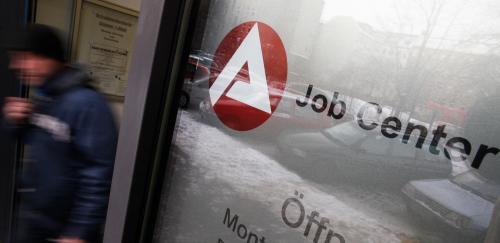For many people, job loss can be a catastrophe with far-reaching negative psychological and economic consequences. Unemployment leads to lower earnings, worse physical and mental health, and lasting unhappiness for those directly affected. The negative psychological consequences of unemployment can even spill over to spouses and children. In a novel research paper, forthcoming in the Journal of Economic Behavior and Organization, we also show that parental unemployment during childhood can have long-term consequences for adult children’s psychological well-being later in life.
We measure subjective well-being using a survey question that asked respondents to rate the satisfaction with their lives as a whole on a scale of 0 (not at all satisfied) to 10 (very satisfied). Furthermore, by using German panel data tracking children and their parents for over three decades, we find that respondents who experienced parental unemployment during early (0–5 years) and late (11–15 years) childhood have lower life satisfaction at ages 18–31. This suggests that the psychological cost of parental unemployment may be higher for young children because negative experiences accumulate over life and stressful events early in life have a stronger effect on outcomes later in life. Older children, on the other hand, may feel pressured to take more responsibility in the family. Another reason could be that at older ages, children start developing abstract thinking, which can make them more aware of the social stigma associated with having jobless parents.
Of course, children’s experiences following parental unemployment are likely to vary according to different circumstances. Boys, for example, tend to be more negatively affected by parental unemployment compared to girls, possibly because at younger ages girls show better emotional self-regulation. Also, interestingly, some children who experienced parental unemployment can have positive consequences as young adults—likely due to the parental investment and the quality of the time unemployment parents spend with their kids. In support of this, previous research from Germany finds that the unemployed spend almost twice as much time caring for their children than employed people and that childcare is, in fact, the only activity that the unemployed enjoy more than the unemployed.
The effects we estimate are relatively modest: Parental unemployment experienced at ages 0-5 lowers young adults’ life satisfaction by about 0.59 points on average, which is about 8 percent of the sample mean. Similarly, the long-term scarring effect of parental unemployment experienced at ages 11-15 is on average about 0.34 points (on a 0-10) scale, which represents about 5 percent of the sample mean. Indeed, these effects may appear small in magnitude but are economically meaningful, considering that they are a long-term effect, and in some cases, are felt several decades after the negative experience.
Our research demonstrates that the intergenerational psychological costs of unemployment are more nuanced than previously thought and suggest that programs targeting unemployed parents can also help to alleviate the persistent psychological burden on children. Finally, because subjective well-being is associated with positive outcomes in many life domains, childhood policy interventions such as psychological coaching and helping kids overcome the trauma of parental unemployment can potentially provide life-long benefits.
The Brookings Institution is committed to quality, independence, and impact.
We are supported by a diverse array of funders. In line with our values and policies, each Brookings publication represents the sole views of its author(s).








Commentary
How having unemployed parents affects children’s future well-being
July 13, 2018